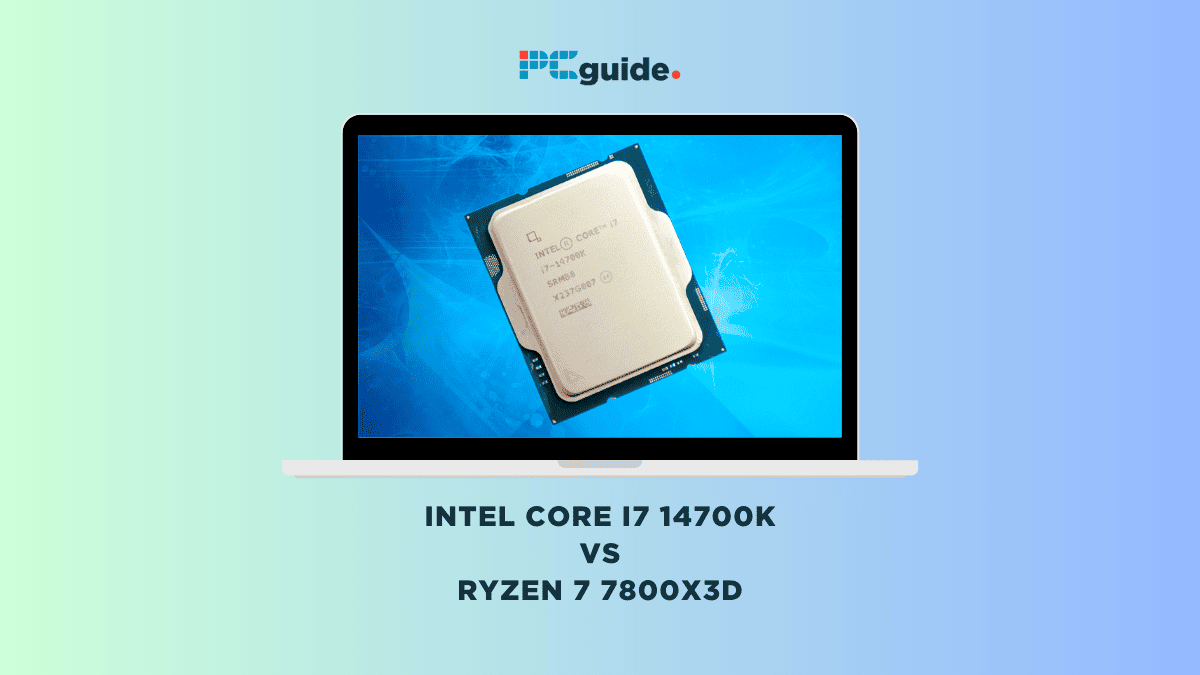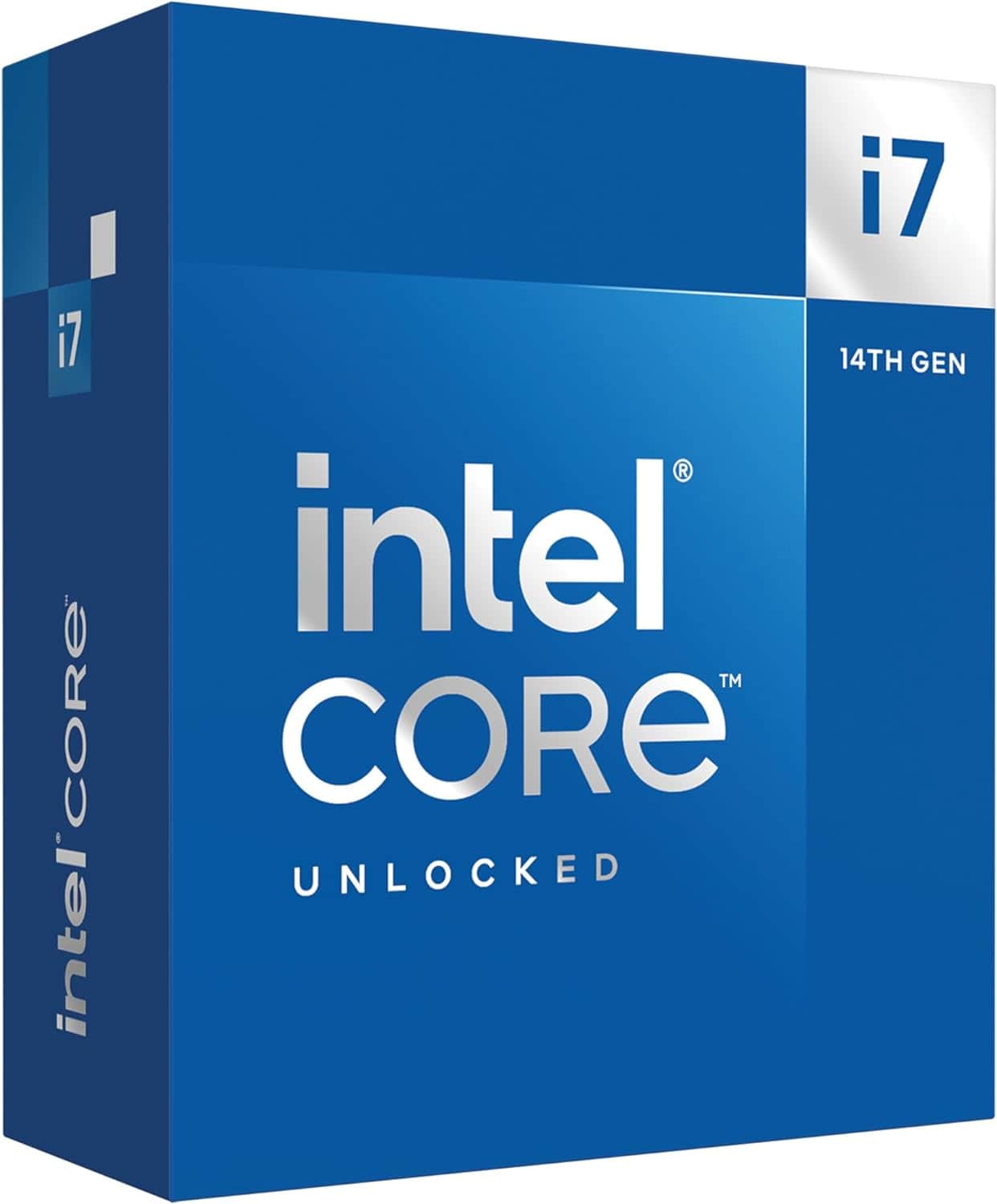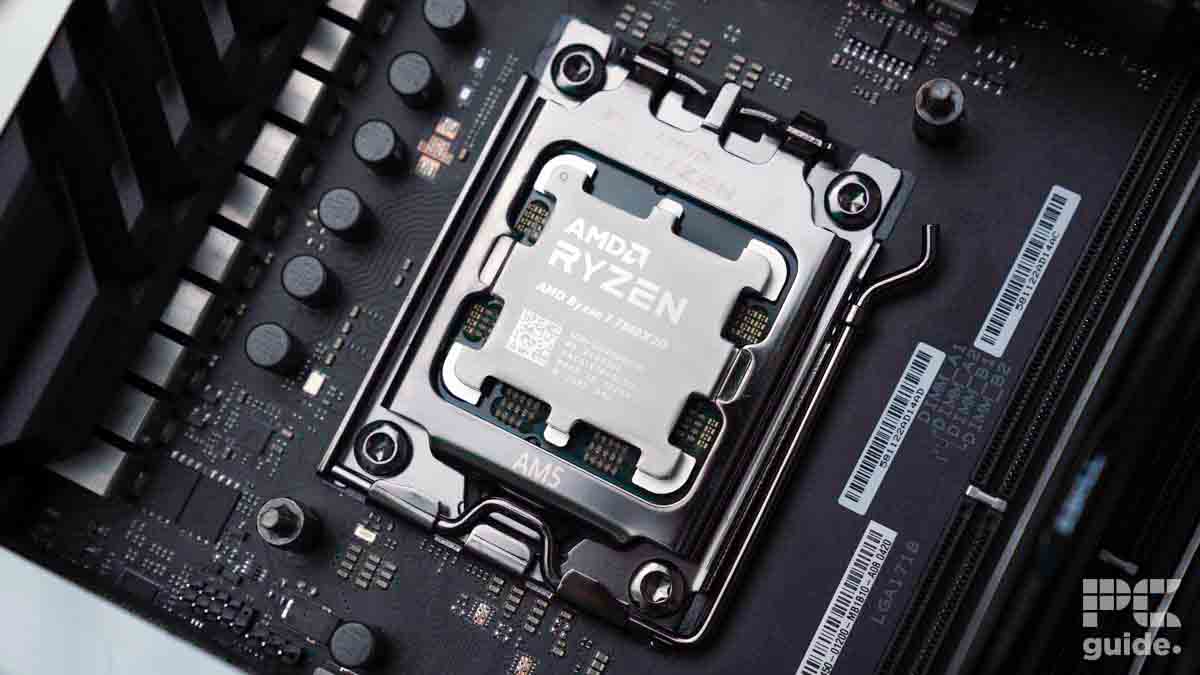Intel Core i7 14700K vs Ryzen 7 7800X3D – Intel or AMD?

Table of Contents
In this article, we dive deep into a head-to-head comparison between the Intel Core i7 14700K vs. Ryzen 7 7800X3D. Intel has strategically maintained its pricing for the new 14th-gen models, matching that of the previous generation, as a countermove to AMD’s emerging Ryzen 7000X3D series.
While Intel’s Raptor Lake Refresh presents a harmonious mix of gaming and productivity prowess, keeping AMD on its toes, early indications suggest that AMD’s CPUs may have an edge in performance over their Intel counterparts.
Intel Core i7 14700K vs. Ryzen 7 7800X3D: Specs
In the ever-evolving CPU landscape, the Intel Core i7-14700K and the Ryzen 7 7800X3D stand as formidable contenders, each offering a unique blend of features and performance metrics. The Core i7-14700K, part of Intel’s CPU lineup, comes equipped with a robust 20 cores—8 performance cores (p-cores) and 12 efficiency cores (e-cores).
This core configuration gives Intel a distinct edge in multitasking and applications that thrive on high multi-core activities. With 28 threads and a higher turbo boost frequency of 5.6 GHz, it’s clear that Intel aims to dominate in processing power.
Conversely, AMD’s Ryzen 7 7800X3D is no slouch, especially when it comes to its architecture. It operates at a higher base frequency of 4.2 GHz and boasts an impressive 96 MB of L3 cache memory. This sizable cache is a game-changer in the realm of gaming benchmarks, offering unparalleled responsiveness and performance.
| Feature | Core i7-14700K | Ryzen 7 7800X3D |
|---|---|---|
| Cores | 20 (8+12) | 8 |
| Threads | 28 | 16 |
| Base clock | 3.4 GHz | 4.2 GHz |
| Boost clock | 5.6 GHz | 5 GHz |
| L2 / L3 CACHE | 33 MB L3 Cache | 96 MB (L3) |
| TDP (PL1) | 125W | 120W |
| MSRP | $409 | $449 |
Power efficiency and value considerations
When it comes to power efficiency, both CPUs have their merits. However, the Ryzen 7 7800X3D tends to have a better value-to-performance ratio, particularly for gaming enthusiasts.
Hardware and compatibility
Both CPUs are compatible with a range of motherboards and hardware, including support for RTX graphics cards. However, if you’re looking for higher critical temperature thresholds, Ryzen CPUs generally offer more leeway.
Price-wise, Intel’s offering stands at $409, while the Ryzen is slightly pricier at $449. Your choice between the two ultimately hinges on your specific needs. If you prioritize multitasking and various desktop applications, Intel’s CPUs may offer the advantages you seek. On the other hand, if gaming performance and power efficiency are your top concerns, the advantages of AMD Ryzen can’t be ignored.
By examining various CPU comparisons and synthetic tests, it’s evident that both processors have their pros and cons. Whether it’s single-core performance or power consumption that you’re concerned about, understanding these key differences will guide you in making an informed decision.
Intel Core i7 14700K vs. Ryzen 7 7800X3D: Performance
When it comes to gaming performance, AMD’s Ryzen 7 7800X3D continues to reign supreme, thanks in part to its substantial L3 cache size.
This cache advantage has consistently placed the Ryzen 7 7800X3D at the forefront of gaming benchmarks, solidifying its reputation as the go-to choice for gamers seeking the best value and performance.
Gaming vs. productivity
However, the narrative shifts when we focus on standard productivity applications and common operations. Intel’s Core i7-14700K, built on a modern manufacturing process, offers a minor impact in gaming—showing only a 2% improvement over its predecessor.
Yet, it excels in desktop CPUs for productivity tasks, outperforming even the Ryzen 9 7900X by a notable 17% margin in similar performance metrics.
Synthetic tests and benchmark results
According to synthetic test results, the Core i7-14700K’s additional E-cores make it a formidable contender against the Ryzen 9 7900X, especially in tasks that demand multi-threading capabilities.
While it may not compete with the Ryzen 7 7800X3D in gaming, it does surpass the Ryzen 7 7700X in both gaming and other applications, according to the new version of this benchmark.
Full technical specification of Intel Core and its implications
When we examine the full technical specification of Intel Core i7-14700K, it becomes evident that its E-cores contribute significantly to its prowess in productivity tasks. This makes it a compelling option for users who require a balanced CPU that can handle various tasks efficiently.
In conclusion, both CPUs have their merits and drawbacks. If gaming is your primary concern, the Ryzen 7 7800X3D offers unparalleled performance.
On the other hand, if you’re looking for a CPU that excels in productivity tasks, the Intel Core i7-14700K stands as a strong contender. Your choice will ultimately depend on your specific needs and what you consider to be the best value for your investment.
Intel Core i7 14700K vs. Ryzen 7 7800X3D Price
When it comes to pricing, AMD generally offers more competitive rates. While the MSRP of the Intel Core i7-14700K is set below that of the Ryzen 7 7800X3D, real-world prices often paint a different picture, with the Ryzen 7 7800X3D frequently available at a more attractive rate.
For gaming enthusiasts, this better-priced Ryzen model seems like a clear choice. However, a switch to the Ryzen 7 7800X3D demands an entire technological revamp. Adopters would need to invest in an AM5 motherboard and DDR5 RAM. This could inflate the total cost of the setup, making it potentially pricier in the grand scheme of things.
Intel Core i7 14700K vs. Ryzen 7 7800X3D: Conclusion
In the showdown between the Intel Core i7-14700K and the Ryzen 7 7800X3D, your choice hinges largely on your priorities. If unmatched gaming prowess is what you seek, the Ryzen 7 7800X3D, with its game-boosting L3 cache, undeniably stands out as the top performer, offering a gaming experience that’s hard to rival.
On the other hand, for those who demand a balanced chip, adept at handling both gaming and multitasking with equal finesse, the Intel Core i7-14700K shines. With its distinctive combination of P and E cores, it offers superior multi-thread performance, ensuring that productivity tasks run seamlessly. In essence, while the Ryzen 7 stands as the gaming champion, the i7-14700K emerges as the jack-of-all-trades, excelling in both gaming and multitasking arenas.


